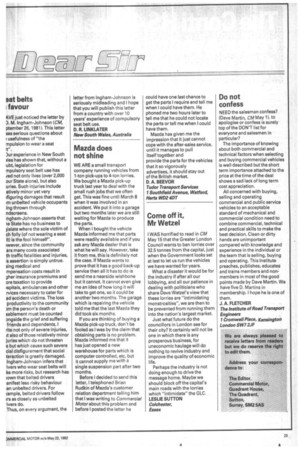eat belts 'favour
Page 17

If you've noticed an error in this article please click here to report it so we can fix it.
AVE just noticed the letter by ). M. Ingham-Johnson (CM, ptember 26, 1981). This letter ses serious questions about t usefulness of "the mpulsion to wear a seat It".
Duiexperience in New South Iles has shown that, without a ubt, legislation for
mpulsory seat belt use has red not only lives (over 2,000 our State alone), but also uries. Such injuries include atively minor yet very ;figuring damages that result im unbelted vehicle occupants ing thrown through ndscreens.
ngham-Johnson asserts that le State has no business to )islate where the sole victim of ch folly (of not wearing a seat It) is the fool himself".
twever, since the community ars many costs associated th traffic fatalities and injuries, Is assertion is simply untrue. sing medical and
mpensation costs result in her insurance premiums and ore taxation to provide Ispitals, ambulances and other rvices necessary to cater for ad accident victims. The loss productivity to the community )m the person's death or sablement must be counted ongside the grief and suffering friends and dependents. I rite not only of severe injuries, it also of those relatively minor juries which do not threaten e but which cause such severe cial disfigurement that social teraction is greatly damaged. Ingham-Johnson infers that ivers who wear seat belts will ke more risks, but research has town that belted drivers anifest less risky behaviour an unbelted drivers. For cample, belted drivers follow irs as closely as unbelted -ivers do.
Thus, on every argument, the letter from Ingham-Johnson is seriously midleading and I hope that you will publish this letter from a country with over 10 years' experience of compulsory seat belt use.
D. R. LINKLATER New South Wales, Australia






























































































